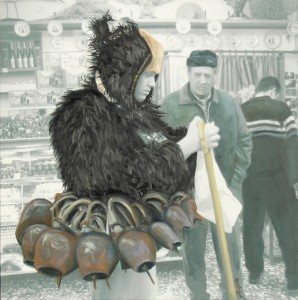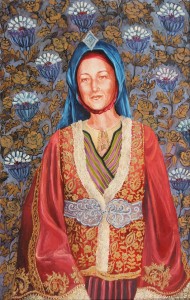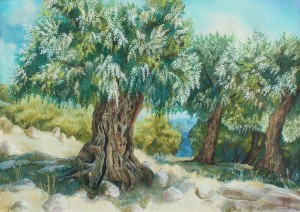Pascaline Bossu: “My Impressions of Greece” [interview]
Visual artist Pascaline Bossu was born in France but she lives and works in Athens since 2000. The landscapes and the people of Greece have been her source of inspiration through the years. The artist is now presenting her “Impressions of Greece” in an exhibition of sketches, paintings and photographs at the Heiraklidon Museum in Thissio.
Pascaline spoke to EmbassyNews.net about her double identity and the way art made her love and adopt the Greek culture.
Interview to Eleftheria Pantziou
ΕΝ: Please, tell us a few words about the exhibition. What is your “Impression of Greece”?
Pascaline Bossu: Our idea – with the owners of the Herakleidon Museum, Paul and Belinda Firos – was to organize an exhibition of landscapes, trees and the olive tree that I have made with red chalk, which was used in the 17th century and was one of Leonardo da Vinci’s main drawing materials. There is also another series of paintings, more “classic” I would say, with elements of old engravings. Mr Paul had seen these series and wanted to organize an exhibition under that theme.
The Museum is spacious so, we decided expand the exhibition further. Greece’s traditional costumes always fascinated me, due to their fine fabrics and parts with such beautiful embroideries that need such a long time to make but also stand the test of time. Greek traditional costumes are like today’s “haute couture”. The only difference is that they were made within the family, to be worn on special occasions, celebrations, weddings and so on…
EN: When did you first experiment with Greek, traditional costumes?
Pascaline Bossu: My first impression of Greek costumes was in 2005, when I held an exhibition on the island of Skyros with traditional carnival costumes.  I used ink and photographs printed on canvas and drawn with oil. As a foreigner it was my chance to witness the carnival and as an artist to put color to the images. What impressed me the most was that on Kathara Deftera (Clean Monday) all families wore their traditional costumes, from the oldest generation to the youngest members!
I used ink and photographs printed on canvas and drawn with oil. As a foreigner it was my chance to witness the carnival and as an artist to put color to the images. What impressed me the most was that on Kathara Deftera (Clean Monday) all families wore their traditional costumes, from the oldest generation to the youngest members!
I had held a similar exhibition with traditional costumes of Morocco, so I figured it was time to make a series of Greek costumes. I went to the Benaki Museum and took a lot of pictures of their costumes collection. But I also needed a series of faces for my portraits. In the Morocco series I used the faces of strangers, but this time I needed something intimate. My daughter, Célestine, had just turned 20 and I thought I’d start with her face, as she is half Greek. She was my first portrait in the costume of Attica.
My models pose for me to photograph them as in the 19th century. People at that time had to stand still, almost without any expression on their faces, because it needed several minutes for one photograph to be taken. It is strange that today we take so many pictures on a daily basis with our cell phones, in various poses, selfies etc. and we are always on the move. It is exactly the opposite! Only now we are reluctant to pose. There are so many images around us, but we don’t know how to pose!
I asked my family to pose for the photographs of this exhibition, which was really difficult, since it took 20-50 shots for them to finally relax and give their best.
EN: How did you manage to harmonically connect the traditional costumes to the Greek family?
Pascaline Bossu: After Célestine’s portrait, I had to find a way to continue with the series. During that time I had the chance to watch the play, “The mother of Dog”, by Pavlos Matesi with Dimitra Hatoupi, which is a really powerful story of a woman and her daughter, in a Greek village during World War II. It reminded me of my great-grandmother who had two children from her first marriage. She lost her husband during World War I, but in 1919 she met a man and she gave birth to a daughter out of marriage, my grandmother. My grandmother never met her father, which was very difficult for her. Her struggle with the past made me think of the things each generation leaves to the next and the memories we keep inside our minds and hearts from our grandparents. Since the Greek costume is a family item that passes on from mother to daughter and father to son, I thought I’d paint my daughter, her mother – myself, her grandmother, my father, my grandfather… As a result you see the faces of Greeks and French, wearing Greek costumes.
I also tried to present them in costumes from areas that are somehow connected to their lives. My great-grandmother looks a lot like a woman from the East. In her twenties, during World War II she and her family had to leave their home as refugees. So, her portrait is in a costume of Asia Minor.
My grandfather had been a soldier all his life. So his portrait is in a costume of the Greek Revolution.
EN: It’s like a journey around the world, through time…
Pascaline Bossu: Exactly! There is a detailed note that accompanies each painting and provides details on the costume, the story of the person wearing it and the reason why I matched the person to the costume.
My portrait is in a costume of Thassos, because it’s been my vacation place since I was a baby. Thassos was my first impression of Greece, the place where I learned how to dance zeimbekiko… It’s like my second birthplace… And this is why many landscapes I’ve drawn originate from Thassos.
EN: Please, give us some more details on the landscapes included in this exhibition.
Pascaline Bossu: The exhibition’s idea is to present Greece, through the eyes of a foreigner. My first impression of Greece was its nature, so I made the landscapes series with pastel and red chalk, ink, oil and mixed techniques.
I walk a lot in the forest and I take a lot of pictures, so the series includes many olives and planes. I consider it a journey through time, since olives and planes are massive trees, they live for a long time and witness so many changes. There is a village near Kazaviti on Thassos with a forest of very old trees and lush vegetation, really wild! It looks like a place of the Greek mythology! I get intense emotions just walking there. I feel the energy! I tried to depict that energy and the immortality of the place.
There are also paintings from Skyros and some small sketches from my first time alone on Thassos. I made them while sitting in the village’s “kafenio”, which was my first, close contact with the locals. At first they acted really strange. There I was… a very young, foreign woman among Greek men, not speaking Greek… They were angrily looking at me, but then they saw my work and they approached me. Our contact became possible through my artwork. Some of them left and came back with honey, which they offered as a gift! Then the village’s women came and they took me to their homes!
During that journey I had the chance to take a lot of pictures of their Easter customs, the religious services, the traditional Easter feast, the Greek culture in general.
EN: When did you permanently move to Athens and how was it at first?
Pascaline Bossu: My ties with Greece were strong but I moved here, when I was 29 years old.
I’ve never really studied Greek, so I am still struggling with the language after 15 years (laughs)… it needs a lot of work! When I was 12 years old, I was on vacation with my parents on Thassos and I met Pericles, who was my first love. When I got home I bought a book and started learning the Greek alphabet. Then during my studies in Paris I would take Greek language lessons whenever I had the chance. When I moved to Athens I stayed with my husband’s family and I experienced the Greek family’s ties. It was difficult at first but then we moved to Halandri and I started working as a graphic designer. At some point I started teaching my daughter how draw. Art was part of my studies throughout the years, but I started teaching children after I came to Greece. And I evolved with them as an artist.
EN: And you started creating your own artwork…
Pascaline Bossu: Yes, exactly! A friend from the Greek-French High School Eugène Delacroix also helped me get my own art space. I collaborated with the Greek-French High School Eugène Delacroix, as I started teaching art to children. In 2002 I opened the “Atelier Coccinelle” and in 2008 I got in touch with the Herakleidon Museum and I started teaching at its premises. I used to select a theme which covered 6 lessons, and we focused on one artist, his life and work and then we tried to make a copy of his work, using his own techniques. In the last three lessons, children were free to create their own artwork, based on what they had learned so far. We also organized exhibitions.
Working with children has been a great experience. It’s nice to feel that your life is full of play and joy!
EN: You are also working as an interior designer…
Pascaline Bossu: I started working as an interior designer in 2009, when I undertook the interior decoration of a tea-room in Halandri, on the theme of the gardens of Versailles. In 2010 I decorated the entrance hall of the Glyfada Golf Club and in 2011 the St. Georges Lycabettus hotel on the occasion of the cultural, gastronomic and tourist festival organized by the Embassy of the Kingdom of Morocco in Greece. In 2012 I designed the shop windows of Coco-Mat, on themes inspired by the traditional costumes of Morocco. Last year I started collaborating with Leroy Merlin Greece as a stylist-decorator. As a graphic designer, as an artist, as an interior designer I always use my artwork in everything I make.
EN: You’ve also created your own art space, your home – the “Kokkino Home”…
Pascaline Bossu: “Kokkino Home” was actually my home for many years. It was spacious enough to be able to work there and display my artwork. Every June, for one weekend I would organize an event and present the work of many artists – painters, sculptors, photographers…
I am now in the process of moving to central Athens, probably to a similar art space in Thissio.
EN: Greece is undergoing difficult times. What keeps you here in Athens?
Pascaline Bossu: It is something that is long gone in France… Although things are difficult in Greece there is a kind of freedom. A freedom of expression, a freedom of movement… And people may be reluctant at first but then, they become your friend… like the people of Thassos. At first they looked at me in a strange way, but they returned with gifts and honey! Communication is much more feasible here.
EN: Is there something that you dislike about Greece?
Pascaline Bossu: Greeks are not so environmentally conscious. However I am confident, this will change since the new generation is more environmentally sensitive and active.
Photos by Pascaline Bossu




